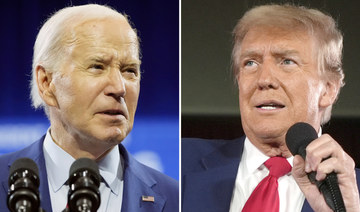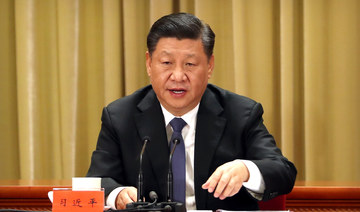NEW YORK: As students protesting the Israel-Hamas war at universities across US dug in Saturday and vowed to keep their demonstrations going, some universities shut down encampments after reports of antisemitic activity among the protesters.
With the death toll mounting in the war in Gaza, protesters nationwide are demanding that schools cut financial ties to Israel and divest from companies they say are enabling the conflict. Some Jewish students say the protests have veered into antisemitism and made them afraid to set foot on campus.
Early Saturday, police in riot gear cleared an encampment on the campus of Northeastern University in Boston while several dozen students shouted and booed at them from a distance, but the scene was otherwise not confrontational.
The school said in a statement that the demonstration, which began two days ago, had become “infiltrated by professional organizers” with no affiliation to the school and protesters had used antisemitic slurs.
“We cannot tolerate this kind of hate on our campus,” the statement posted on the social media platform X said.
The University of Pennsylvania took similar action Friday when interim President J. Larry Jameson called for an encampment of protesters on the west Philadelphia campus to be disbanded, saying it violates the university’s facilities policies.
The “harassing and intimidating comments and actions” by some protesters violate the school’s open expression guidelines as well as state and federal law, Jameson said, and vandalism of a statue with antisemitic graffiti was “especially reprehensible and will be investigated as a hate crime.”
“I am deeply saddened and troubled that our many efforts to respectfully engage in discourse, support open expression, and create a community that is free of hate and inclusive for everyone have been ignored by those who choose to disrupt and intimidate,” he said.
At Columbia University, where protesters have inspired pro-Palestinian demonstrations across the country, negotiations continued with those at the student encampment.
The university’s senate passed a resolution Friday that created a task force to examine the administration’s leadership, which last week called in police in an attempt to clear the protest, resulting in scuffles and more than 100 arrests.
Though the university has repeatedly set and then pushed back deadlines for the removal of the encampment, the school sent an email to students Friday night saying that bringing back police “at this time” would be counterproductive.
Decisions to call in law enforcement, leading to hundreds of arrests nationwide, have prompted school faculty members at universities in California, Georgia and Texas to initiate or pass votes of no confidence in their leadership. They are largely symbolic rebukes, without the power to remove their presidents.
But the tensions pile pressure on school officials, who are already scrambling to resolve the protests as May graduation ceremonies near.
California State Polytechnic University, Humboldt, gave protesters who have barricaded themselves inside a building since Monday until 5 p.m. Friday to leave and “not be immediately arrested.” The deadline came and went. Only some of the protesters left, others doubled down. After protesters rebuffed police earlier in the week, the campus was closed for the rest of the semester.
In Colorado, police swept through an encampment Friday at Denver’s Auraria Campus, which hosts three universities and colleges, arresting about 40 protesters on trespassing charges.
Students representing the Columbia encampment said Friday that they reached an impasse with administrators and intend to continue their protest. After meetings Thursday and Friday, student negotiators said the university had not met their primary demand for divestment.
In the letter sent to Columbia students Friday night, the university’s leadership said “we support the conversations that are ongoing with student leaders of the encampment.”
Columbia’s president, Minouche Shafik, faced significant criticism from faculty Friday, but retained the support of trustees.
A report by the university senate’s executive committee, which represents faculty, found Shafik and her administration took “many actions and decisions that have harmed Columbia University.” Those included calling in police and allowing students to be arrested without consulting faculty, misrepresenting and suspending student protest groups and hiring private investigators.
Also Friday, Columbia student protester Khymani James walked back comments made in an online video in January that recently received new attention. James said in the video that “Zionists don’t deserve to live” and people should be grateful James wasn’t killing them.
“What I said was wrong,” James said in a statement. “Every member of our community deserves to feel safe without qualification.”
James, who served as a spokesperson for the pro-Palestinian encampment as a member of Columbia University Apartheid Divest, was banned from campus Friday, according to a Columbia spokesperson.
Protest organizers said James’ comments didn’t reflect their values. They declined to describe James’ level of involvement with the demonstration.
In France, students at the Paris Institute of Political Studies, which counts President Emmanuel Macron among its many famous alumni, students blocked access to a campus building and classes went online as the wave of protests reached overseas.
Police clashed with protesters Thursday at Indiana University, Bloomington, where 34 were arrested; Ohio State University, where about 36 were arrested; and at the University of Connecticut, where one person was arrested.
The University of Southern California canceled its May 10 graduation ceremony Thursday, a day after more than 90 protesters were arrested on campus. The university said it will still host dozens of commencement events, including all the traditional individual school ceremonies.
Universities where faculty members have initiated or passed votes of no confidence in their presidents include Cal Poly Humboldt, University of Texas at Austin and Emory University.
Anti-war protesters dig in as some schools close encampments after reports of antisemitic activity
https://arab.news/5wq76
Anti-war protesters dig in as some schools close encampments after reports of antisemitic activity
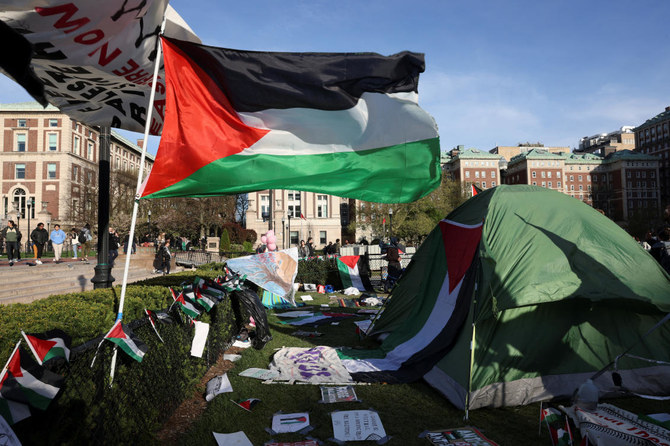
- Protesters nationwide are demanding that schools cut financial ties to Israel and divest from companies they say are enabling the conflict
- Early Saturday, police in riot gear cleared an encampment on the campus of Northeastern University in Boston while several dozen students shouted and booed at them
Putin reappoints Mishustin as Russia’s prime minister
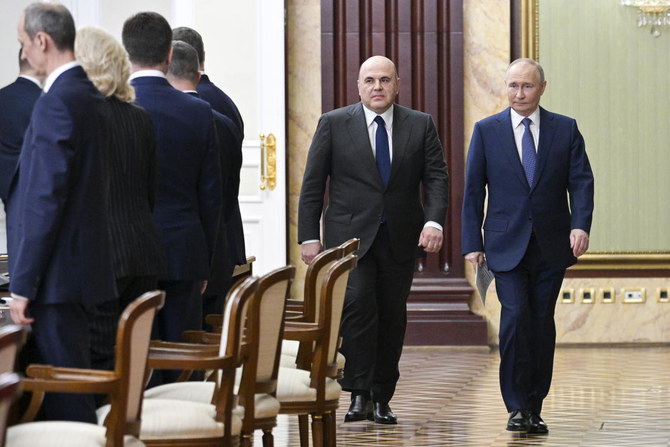
Parliament Speaker Vyacheslav Volodin said the house, the State Duma, will hold a session later Friday to consider Mishustin’s candidacy.
Mishustin’s approval is a mere proforma in the Kremlin-controlled parliament.
In line with Russian law, Mishustin, 58, who held the job for the past four years, submitted his Cabinet’s resignation on Tuesday when Putin began his fifth presidential term at a glittering Kremlin inauguration.
Mishustin’s reappointment was widely expected by political observers, who noted that Putin values his skills and the lack of political ambition. Mishustin, the former head of Russia’s tax service, has kept a low profile, steering clear of political statements and avoiding media interviews.
In surprise move, Somalia asks UN to end political mission
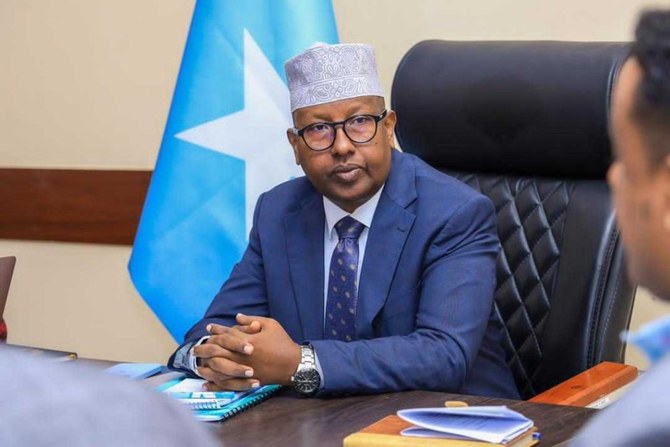
- UN body of 360 members began work in 2013
- Horn of Africa nation in conflict since 1991
- Federal government seen as becoming more assertive
NAIROBI: Somalia’s government has requested the termination of a UN political mission that has advised it on peace-building, security reforms and democracy for over a decade, according to a letter the foreign minister wrote to the Security Council.
The request for the departure of the 360-member United Nations Assistance Mission in Somalia (UNSOM) when its mandate expires in October took the mission by surprise, three UN officials told Reuters, asking not to be named.
In the face of continuous conflict since 1991, including a two-decade insurgency by Al-Qaeda-linked militants, Somali authorities have taken steps to restore services and provide a measure of security. But the Horn of Africa nation of 17 million people remains among the world’s most violent and impoverished.
The end of the political mission is separate to a UN-mandated African Union peacekeeping mission, currently comprising at least 10,000 soldiers, which is due to withdraw and hand over to the Somali state by the end of this year.
The three UN officials confirmed the authenticity of the May 5 letter, which was circulated on social media on Thursday. Somali officials did not respond to requests for comment.
’More assertive’ state
In the letter, Minister of Foreign Affairs Aimed Moa Fiji did not give reasons, saying only that the government believes “it is now appropriate to transition to the next phase of our partnership.”
A Somali presidential adviser confirmed the authenticity of the letter and said Somalia no longer needed support from the UN to coordinate with the international community as was the case under UNSOM.
“UNSOM played a critical role, but now it outlived its usefulness,” the adviser said, adding that the mission also had a high annual cost of $100 million.
Matt Bryden, a Somalia analyst and co-founder of the Sahan think tank, noted that the federal government had previously accused UNSOM of interfering in internal affairs.
President Hassan Sheikh Mohamud has been moving to centralize authority through changes to the constitution and other reforms while UNSOM has been trying to strike a balance between the federal government’s agenda and the desire of individual states for more autonomy, Bryden said.
“We should expect more assertive and unilateral FGS (federal government of Somalia) initiatives with respect to constitutional revisions, federalism, and elections,” Bryden said.
In a statement to Reuters, UNSOM said Somalia’s request was “a testament to the work of UNSOM in support of the Somali authorities these past years.”
Other UN offices, including humanitarian agencies, would continue to operate in Somalia, said UNSOM, which was created in 2013.
India vote a chance for Kashmiris to signal opposition to Modi
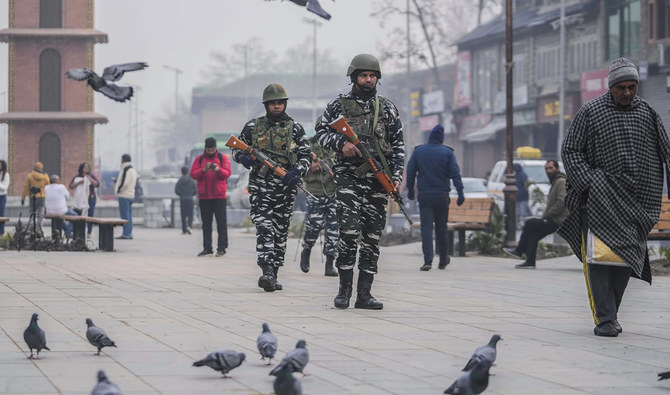
- Widely expected to win poll, Modi’s Bharatiya Janata Party (BJP) did not field any candidates in Kashmir for the first time in nearly three decades
- Modi’s government canceled the limited autonomy Kashmir had under India’s constitution in 2019, accompanied by a huge security clampdown
SRINAGAR: Prime Minister Narendra Modi’s campaign speeches claim his quelling of an insurgency in Kashmir as one of his greatest achievements, but many in the disputed region see India’s election as a chance to signal their disagreement.
Widely expected to win the biggest poll in history, Modi’s ruling Bharatiya Janata Party (BJP) did not field any candidates in Kashmir for the first time in nearly three decades. Experts say they would have been roundly defeated if they had.
Modi’s government canceled the limited autonomy Kashmir had under India’s constitution in 2019, a move accompanied by a huge security clampdown, mass arrests of local political leaders and a months-long telecommunications blackout.
Violence in the Muslim-majority region has since dwindled, and the BJP has consistently claimed that its residents supported the changes.
But some Kashmiri voters in this year’s national elections will be eager to express their frustrations with the end of their territory’s special status.
“I have never voted in the past. But this time, I will... to show that I am not happy with what India is doing with us,” a middle-aged man told AFP in the main city of Srinagar, declining to be identified for fear of retribution.
“How can India say that Kashmiris are happy when we are actually suffocating in a state of fear and misery?“
Kashmir has been divided between India and Pakistan since their independence in 1947. Both claim it in full and have fought two wars over control of the Himalayan region.
Rebel groups opposed to Indian rule have waged an insurgency since 1989 on the side of the frontier controlled by New Delhi, demanding either independence or a merger with Pakistan.
The conflict has killed tens of thousands of soldiers, rebels and civilians in the decades since, including a spate of firefights between suspected rebels and security forces in the past month.
India is in the middle of a six-week election, with voting staggered across phases to ease the logistical burden of staging a vote in the world’s most populous country.
Modi and his ministers have championed the end of Kashmir’s special status, saying at campaign rallies it has brought “peace and development,” and the policy is popular among voters elsewhere in India.
But many in the valley have chafed at increasing curbs on civil liberties that have curtailed media freedoms and brought an effective end to once-common public protests.
Many are also upset with the 2019 decision to end constitutional guarantees that reserved local jobs and land for Kashmiris.
Open campaigning for separatism is illegal in India, and established democratic parties in Kashmir have historically differed on whether to collaborate with the government of the day in New Delhi or to pursue greater autonomy.
But antipathy toward Modi’s Hindu nationalist government had helped paper over differences between rival parties by forging a common sense of opposition, parliamentary candidate Waheed Ur Rehman Para told AFP.
“There’s a huge solidarity silently in Kashmir today for each other, irrespective of party lines,” he said.
Para is standing for a seat that takes in Srinagar, the territory’s biggest city, on behalf of the Peoples Democratic Party (PDP), which was a BJP ally before 2019 but is now campaigning for the reinstatement of Kashmir’s autonomy.
Voters were preparing to “convey to Delhi that the consent of decisions about Kashmir is most important and it should lie with the locals,” he said.
Political analyst and historian Sidiq Wahid told AFP the election was being seen by Kashmiris as a “referendum” on the Modi government’s policies in the territory.
“The BJP is not fielding any candidates for a very simple reason,” he said. “Because they would lose, simple as that.”
Modi’s party retains a presence in Kashmir in the form of a heavily bunkered and almost vacant office in Srinagar.
The complex is under constant paramilitary guard by some of the more than 500,000 troops India has permanently stationed in the region.
The BJP has appealed to voters to instead support smaller and newly created parties that have publicly aligned with Modi’s policies.
India’s powerful home minister Amit Shah, a close acolyte of Modi, said at a campaign rally last month the party had made a tactical decision not to field candidates.
He said he and his allies were in no rush to “see the lotus bloom” in Kashmir, a reference to the BJP’s floral campaign emblem, but would instead wait for the people of the valley to understand its good work.
“We are not going to conquer Kashmir,” he told the crowd. “We want to win every heart in Kashmir.”
Republican veepstakes: who will complete the Trump ticket?
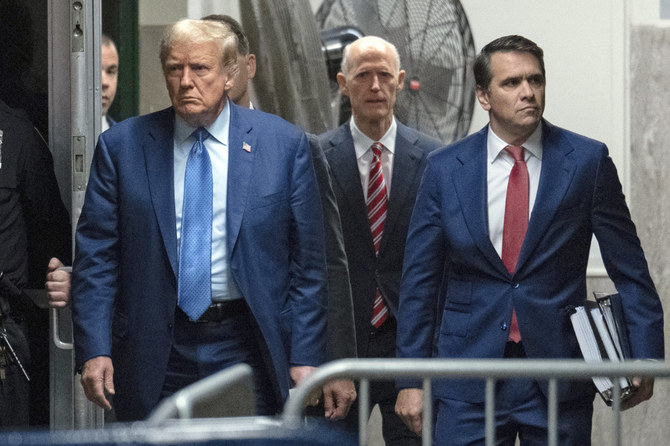
- All eyes are on White House hopeful Donald Trump as he considers potential running mates
- A shrewd vice presidential pick could help the Republican tycoon broaden his support base
WASHINGTON: It could be a loyal lieutenant, an ex-rival or perhaps a political newcomer, but one thing is certain: all eyes are on White House hopeful Donald Trump as he considers potential running mates.
A shrewd vice presidential pick could help the Republican tycoon broaden his support base, and a handful of names have emerged as most likely to appear at Trump’s side as he limbers for a second showdown with Joe Biden in November.
Here are the most commonly-cited runners and riders.
It is no secret that Trump likes what Scott’s profile says about the staunchly conservative, deeply religious African American US senator from South Carolina — and what it would say about the Republican ticket.
The former president is constantly praising the 50-year-old, his one-time rival for the Republican nomination, for his loyalty.
“You’re a much better candidate for me than you were for yourself,” Trump told Scott at a recent rally.
With Scott as his right-hand man, Trump would hope to make inroads with Black voters, who largely preferred Biden in 2020.
But detractors criticize the senator for lacking the presence required to assert himself, particularly during debates.
Stefanik, 39, was a considered a moderate when she entered Congress, but her lurch to the right during a meteoric rise to the Republican leadership can be explained in two words: Donald Trump.
The New York congresswoman has embraced all of the billionaire’s causes, winning his approval and appreciation in return.
A Trump campaign with Stefanik on the ticket could win back some of the women that have turned away from Trump since his 2016 victory.
But the fervent Trump loyalist could also turn off more moderate voters.
Vance hasn’t always been a fan of Trump, something the former president enjoys bringing up from time to time.
But count the 39-year-old former military officer out at your peril.
Known for a best-selling memoir on the travails of poor, white America, Vance entered politics relatively recently.
The first-term senator from Ohio has already made plenty of allies in Republican circles, not least because of his ability to raise large sums of money for his party.
In a country where election victories can cost billions of dollars, big fundraisers are rarely short of friends.
Trump and Marco Rubio have history.
The Florida senator was pitted against the real estate tycoon in the 2016 Republican primary, during which Rubio openly mocked his more popular rival over his complexion, and for having small hands.
But the former adversaries seem to have buried the hatchet.
Trump will weigh the potential for an electoral boost among Hispanic voters with the selection of the 52-year-old son of Cuban immigrants, who takes a keen interest in foreign policy.
A section of the hard right, however, has never forgiven Rubio for pushing immigration reforms more than 10 years ago that they saw as too liberal.
Trump’s last rival in the Republican primaries would be a surprising pick indeed. But a Vice President Nikki Haley isn’t out of the question.
The 52-year-old has yet to endorse the man who, during the final months of the primary campaign, referred to her as “birdbrain.”
But the former South Carolina governor is popular with the moderates and independents that Biden is keen to wrest from the Republicans — and that Trump would do well to court.
North Dakota governor Doug Burgum and Florida senator Rick Scott have also been mentioned as possibilities, although — as fellow rich, white men — they would offer little contrast from Trump.
Vivek Ramaswamy — the upstart newcomer who shook up the first Republican primary debate — is also on the fringes of the conversation, alongside Congressman Byron Donalds, another Floridian, and firebrand former TV presenter Kari Lake.
Long seen as a credible contender, South Dakota governor Kristi Noem has seen her political stock plummet since she recounted having shot dead a pet dog she was unable to bring to heel.
AFP reached out to the Trump team for a hint on the kind of candidate that might turn the candidate’s head. A campaign aide demurred.
“Anyone claiming to know who or when President Trump will choose his VP is lying, unless the person is named Donald J. Trump,” he said.
Chinese companies hit with US trade restrictions over spy balloon incident

- Sanctions show the Biden administration is continuing to punish Beijing over the spy balloon, which drifted over the US in February 2023
- The trade restriction list has been used aggressively by the US to stem the flow of technology to China amid concerns Beijing could use it to bolster its military capabilities
WASHINGTON: The Biden administration added 37 Chinese entities to a trade restriction list on Thursday, including some for allegedly supporting the spy balloon that flew over the United States last year, heightening tensions between Beijing and Washington.
The Commerce Department also said it was adding some units of China Electronics Technology Group to the list for allegedly trying to obtain American technology to support China’s quantum technology capabilities, “which has serious ramifications for US national security” due to their military applications.
Media have said state-owned China Electronics Technology Group is a top military equipment supplier.
China Electronics Technology Group could not immediately be reached for comment.
The Chinese embassy in Washington called the move “blatant economic coercion and bullying in the field of technology,” and said China would resolutely safeguard the lawful rights of Chinese firms and institutions.
The announcement shows the Biden administration is continuing to punish Beijing over the spy balloon, which drifted over the United States in February 2023, fueling political outrage in Washington and prompting Secretary of State Antony Blinken to cancel a trip to China.
That month, the Commerce Department added five companies and one research institute to the entity list for supporting “China’s military modernization efforts, specifically the People’s Liberation Army’s (PLA) aerospace programs including airships and balloons.”
China’s foreign ministry had said it was a weather balloon that had blown off course and accused the United States of overreacting.
The trade restriction list, known as the entity list, has been used aggressively by the United States to stem the flow of technology to China amid concerns Beijing could use it to bolster its military capabilities.
Being added to the list makes it harder for US suppliers to ship to the targeted entities.
The Biden administration on Thursday also added a handful of Chinese entities to the list for trying to obtain American items for making drones to be used by the Chinese military and others for shipping controlled items to Russia.







